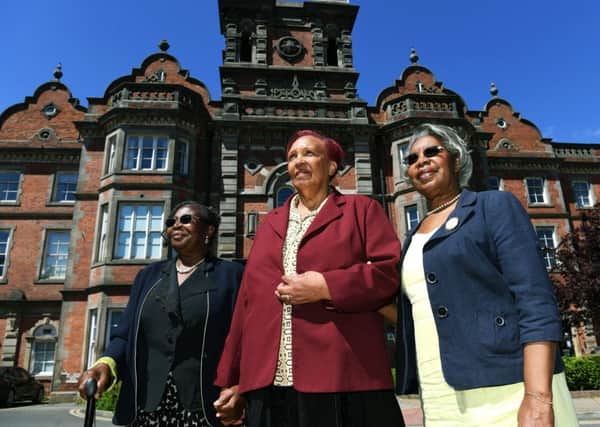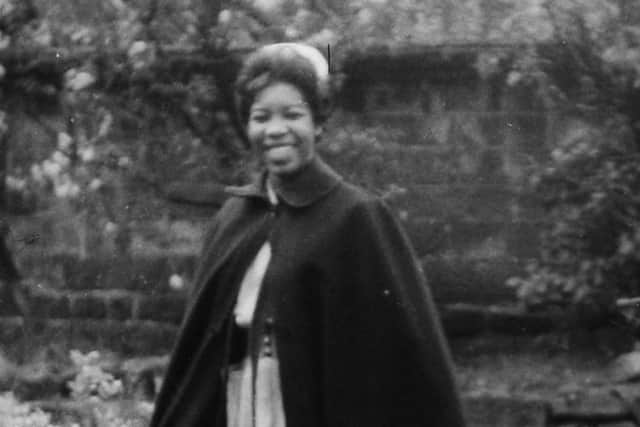The nurses who moved from Jamaica to Leeds and helped build the NHS


Nowadays the imposing Victorian building is home to the Thackray Medical Museum, but 50 years ago it was part of St James’s Hospital. And it was here where these three former nurses first met.
Nettie, Betsy and Yvonne were among the thousands of Caribbean and African women who answered the call during the 1950s and 60s to move to the UK at a time when the health service was struggling to find its feet.
Advertisement
Hide AdAdvertisement
Hide AdIt’s the first time they’ve all been together in Leeds for many years and were united as part of the Eulogy Project, which is commemorating the lives, journeys and heritage of first generation Jamaicans.


Yvonne, who now lives in Wakefield, came to England in 1965. She wanted to do nursing after seeing an advert to train with the NHS. “I went straight to Harrogate hospital for my training. My parents were living in London but because I was recruited from Jamaica I had to go straight to the hospital,” she says.
Betsy, who arrived in England in 1961, worked as a midwife. She initially did her general training in Stratford-upon-Avon before moving to Yorkshire.
Advertisement
Hide AdAdvertisement
Hide Ad“I came to St James’s when the Gledhow wing was built. I was working at St Mary’s and they brought the two wings together and that’s when I started at St James’s.”
Nettie came here earlier, having first arrived in 1958. “I ended up going to London and stopped there with families and then I came to Leeds. So I didn’t have it hard like some folk, because I had somewhere to live.”
They became friends in Leeds but for all of them, swapping the sunshine of the Caribbean for the drizzle of northern England was a culture shock.
Advertisement
Hide AdAdvertisement
Hide AdBetsy remembers her first winter in England being bitterly cold. “I remember one day we were so cold and hungry we went for a walk and got to the cinema and they were showing Gone With The Wind, so we went into the cinema. We were supposed to be at home doing homework but we couldn’t do it because it was too cold.”
She was also surprised at having to work on Christmas Day. “I discovered I had to work eight hours on Christmas Day and there was no proper holiday at the time on New Year’s Day, so that was a shock.
“But there was a different atmosphere on the ward. At lunch time, a turkey was brought out on a trolley and the consultant carved it in the middle of the ward and the strongest thing we had to drink was a stout. It was funny,” she says, with a chuckle.
The weather wasn’t the only difference they encountered. “The whole of England was a culture change,” says Nettie. “You saw all these smoking chimneys and thought they were all factories but they were actually houses.”
Advertisement
Hide AdAdvertisement
Hide AdBetsy, who now lives back in Jamaica, agrees. “I asked, ‘where are the houses?’ And we were told ‘those are the houses’ and it was these buildings with smoke coming out of the chimneys.”
Their image of England wasn’t matched by the reality they encountered, as Betsy explains. “We had to do English history at school and the expectation was that people here knew about us, and knew about our culture, but they didn’t.
“People heard our accents and asked where we were from and I’d say ‘Jamaica’ and they would say, ‘where in Africa is that?’”
They recalled working on wards with up to 40 patients and facing racist comments. “Someone once asked me if we had to wear clothes in Jamaica and I said ‘not at all… it’s too hot to wear clothes. All we do is sit under the tree all day,’” says Nettie. “His fish and chips nearly choked him.”
Advertisement
Hide AdAdvertisement
Hide AdSome of the racist abuse and ignorance is hard to comprehend, with some patients not wanting to even be touched by them. “Some people thought that when you held them the colour of your skin would be left on them so they would be like us,” says Yvonne.
“A lot of them had never seen black people before,” says Nettie. “Some people would say things like ‘don’t put your dirty hands on me.’ But it didn’t bother me. I’m tough and I wouldn’t take any nonsense from anyone.”
They had to develop a thick skin. “There was a group of us and we talked together and learned strategies of how to deal with things,” says Betsy.
Advertisement
Hide AdAdvertisement
Hide Ad“You felt you had to do extra to prove yourself, you had to go the extra mile and I learned that very early.”
Nettie, Yvonne and Betsy and other fellow surviving founding member Lizette Powell, created the Jamaica Society in Leeds, along with the late Errol James and Travis Johnson (Betsy’s late husband).
Yvonne says it was important to feel part of the city and to introduce their own customs and traditions. “Everyone had a different experience and it was important that we got together and established ourselves and remembered some of the things we used to do, because unity is strength. There is a motto back home, ‘out of many, one people,’ and so we got together and set up the Jamaican Society.”
Despite the hardships, they all have fond memories of working in Leeds and there is genuine pride at having been part of the NHS. “We met a lot of good people along the way. The matron at the hospital where I worked took two or three of us under her wing, she wanted to make sure we were all right. She would always look out for us,” says Betsy.
Advertisement
Hide AdAdvertisement
Hide Ad“We were asked to come here. We came on British passports and we paid our own fares. We took care of sick humans. We helped to make this city great. And we wouldn’t change any of that for the world.”
They all feel proud to have worked in the NHS and have no regrets about coming here all those years ago. “I’m sure if I had my life to live over again I would do the same again,” says Betsy.
“I would be wiser and maybe some things I’d approach differently. But in terms of coming to England I have no regrets. I got married here and the experience of coming here was to be treasured, because we can pass that on to our children, the good times and the not so good times.
“It was a learning curve, but I wouldn’t change it and we met some lovely people.”
Advertisement
Hide AdAdvertisement
Hide AdTheir stoicism and compassion are admirable and as a nation we owe these former nurses, and thousands of others like them, a great debt of gratitude for all that they did.
For their part, they’re pleased to be part of the Eulogy project, launched earlier this year. “I think it’s important because we need to leave something behind to show that we made our contribution,” says Yvonne.
“Future generations need to know about the journey people made and the hard work not just of nurses like us but the builders, carpenters, all sorts of people, who came here and made a difference to this country.”
Remembering Jamaican roots
The Eulogy Project was launched in February after receiving a National Lottery Heritage Fund grant.
Advertisement
Hide AdAdvertisement
Hide AdIt is urging people in Leeds to share family keepsakes and mementos of their late loved ones who came to the UK from Jamaica in the 1940s to the 1960s.
The project aims to celebrate the lives, heritage and contributions of those who made the journey from the Caribbean island and who have since passed away.
The project has collected the funeral programmes, photography and stories of over 70 first generation Jamaicans.
There will be an exhibition at Leeds Library from August 1.
For more details go to www.jamaicasocietyleeds.co.uk/eulogy-announcement